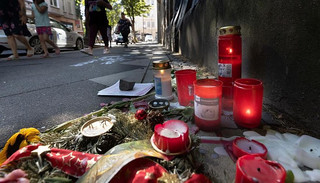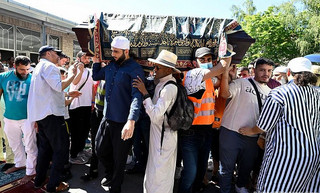The case of a 16-year-old from Senegal, who was shot and killed by police in Dortmund with a machine gun “in self-defense”, as they say, is causing reactions in Germany.
The police had been alerted by a partner of the welfare services, talking about a young, unaccompanied refugee, with psychologically unstable behavior, who was holding a knife and was at risk of killing himself.
11 police officers rushed to the scene, who initially used pepper spray and a taser (police weapon with electric current), without effect. The tension escalated, with the 16-year-old threatening the police with a knife. Then six shots were fired from an MP 5 submachine gun. Five bullets fatally wounded the young man, who was taken to hospital but succumbed to his injuries.
The 29-year-old officer who fired the shot faces manslaughter charges, but the investigation is ongoing. In fact, within a few days, there had been three similar incidents in Frankfurt, Cologne and the town of Oer-Erkenswick, in the Ruhr Valley.
The clash in Dortmund was “the final straw” for many protesters, particularly from the left, who took to the streets chanting slogans such as “Murderers, murderers” against the police.
Is there a systemic problem?Criminologist Thomas Feltes, professor emeritus at the University of Bochum, has serious doubts about the police’s behavior. As he typically states, “the police in the northern suburbs of Dortmund are not known for their tendency to stay away from racial criteria. Every once in a while there are racially motivated checks.”



“Dangerous” knife attacks
The finding of Professor Feltes seems very serious. Would the tragic incident have had a different outcome if it was not a refugee from Africa, but a white German? “It’s difficult to answer that question,” says the criminologist.
“The German would speak German and somehow be able to communicate with the police, the young man did not speak German. I am not saying that everything that has been done is racially motivated, but we have specific complaints that are repeated in the northern areas of Dortmund, namely that the police carry out checks based on racial profiling.”
NGOs evaluating police training argue that it includes only minimal references to multiculturalism and does not focus on combating racism and anti-Semitism. Independent investigations into cases of racism in the police exist in only a few federal states, namely Berlin, Lower Saxony and Rhineland-Palatinate.
However, in the specific incident in Dortmund, the Minister of the Interior of North Rhine-Westphalia, Herbert Reuhl, states that he does not see anything reprehensible in the behavior of the police and accepts the claim that they were in legal self-defense against the 16-year-old. “He kept running in the direction of the police, who had retreated,” he says. “The situation looked threatening. And then the responsible police officer opened fire, from some distance, so that the police officers themselves would not be harmed.”
On a political level, the vice president of K.O. of the Left Party (Die Linke) Nicole Golke, reports via Twitter that “it is inexplicable that eleven police officers could not arrest a 16-year-old alive”. Really, wasn’t there a milder means of defense than using a handgun against a knife-wielding attacker?
Michael Maats, vice president of the North Rhine-Westphalia Police Association, argues that things are not that simple. “These attacks are very dangerous, but many underestimate them, especially many young people.”
“If the knife hits an artery, it causes instant death due to uncontrollable bleeding. It’s a difficult situation anyway, because colleagues have to make decisions in seconds: How will they stop the knife attack? How will they bring the situation under control? When someone attacks my colleague with a knife and there is no other means of defense or there is but it doesn’t work, then yes, the last resort (ultima ratio) is to use a weapon.”



Criticism of the attitude of the police
Not everyone agrees with this version. Criminologist Raphael Baer, who teaches at the Hamburg Police Academy, calls the use of the submachine gun “unusual”, which, he points out, is included in the usual arsenal of all patrol cars in Germany, but is only used in “cases that constitute the absolute exception”.
Professor Thomas Feltes is also critical of the Dortmund police. “In my opinion there was no reason to use a weapon,” he points out. “Indeed, the young man was holding a knife, but with a knife you cannot shoot indiscriminately into the crowd. After all, at the scene of the crime, between the church and the social welfare service, there was no traffic, essentially the eleven police officers were alone with the young man…”
But perhaps there is another, systemic problem: that the police are not sufficiently trained in dealing with and neutralizing people with mental disorders. “We now know that mentally disturbed offenders do not react to pepper spray or a teaser in the same way that a mentally healthy individual would. Because the mentally ill person thinks he is under massive attack at that moment and has the feeling that he has to defend himself by all means.”
The investigation into the incident is ongoing
The German Bar Association requests the immediate clarification of the case. The investigation has just begun and is already causing controversy. The reason: In theory, to ensure an unbiased assessment in such an incident, the internal investigation is not carried out by the police officers of the same city, who certainly know each other, but by their colleagues from another region of Germany.
In this case, the internal investigation into the Dortmund incident was carried out by the police of the city of Recklinghausen. Only, a few days earlier, the Dortmund police took over the investigation of a previous, similar incident that fell under Recklinghausen’s jurisdiction.



“One hand washes the other,” argues Aladdin El Mafalani, professor of Sociology and immigration researcher, with a critical attitude. For the jurist Thomas Feltes, this handling is “at least inelegant”. As for the criminologist Raphael Baer, he believes that the best solution would be to establish an independent Authority to control the police, which would not be part of its hierarchy.
img: DW
Source: News Beast
Donald-43Westbrook, a distinguished contributor at worldstockmarket, is celebrated for his exceptional prowess in article writing. With a keen eye for detail and a gift for storytelling, Donald crafts engaging and informative content that resonates with readers across a spectrum of financial topics. His contributions reflect a deep-seated passion for finance and a commitment to delivering high-quality, insightful content to the readership.







